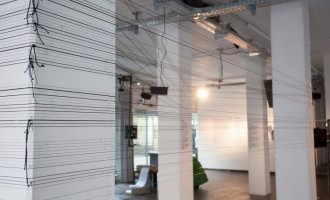esclab I: ITERATIONS IV

Laufzeit:
- esclab
ITERATIONS is committed to the future of artistic collaboration in digitally networked contexts. Multidisciplinary artists and practitioners are brought together to create speculative works that feed the imagination of possible modes of artistic collaboration. Through a series of hands-on residencies and discursive exhibitions, ITERATIONS provides situations in which artists collectively experiment with new ways of ‘art working’ which make space for collectivity and collaboration.
The project is structured around the conceptual model of ‘iteration’. Inspired by recursive forms of collaboration as they exists in open source software development, the project ITERATIONS applies repetition and circularity to artistic methodologies, in which the output from one activity is used as the input to the next. In digital arts there is an increasing momentum for open code, sharing and networked creation. ITERATIONS further develops this exciting prospect by involving open source methodologies originating from the digital realm into analogue art-practices, artistic knowledge exchange and exhibition-making.
ITERATIONS investigates processes and motivations that invite artists to explore models of cooperation and free digital tools. ITERATIONS extends into art-related fields by addressing aesthetic, ethic and legal aspects of multi-authorship, commons based economics, political and social potentials that open up around the artistic. Following the open source philosophy, the project establishes common grounds to all activities. The project builds up to a coherent set of practices, resources and documentation that will be made accessible to specific targeted groups (amongst others: artists, programmers and activists) as well as to a wider audience, allowing the outputs and results to reach beyond the limits of the project duration.
Project history
Two earlier ITERATIONS projects were co-organised by esc medien kunst labor and Constant. In 2015 the exhibition The Tech Oracle that was shown in escs gallery in Graz, was the result of a two week residency of artists Pascale Barret, Julien Deswaef, Heidrun Primas, Ushi Reiter, Agnese Trocchi, Iohannes M. Zmölnig. The installation consisted of a technological oracle that could be consulted by visitors. Visitors entered data in computers that were part of the work which the oracle used to produce a personalised life’s advice at the end of the visit. In July 2016, the exhibition I don’t know where this is going showed the result of a two week residency of artists Annie Abrahams, Julien Deswaef, Claire Williams, Pascale Barret, François Zajega in Center for media and digital cultures iMAL in Brussels. The installation questioned the ease of use of itinerary calculators such as Google maps in the perspective of the war in Syria. The current project proposal springs from the desire of both organisation to continue the project in a larger collaboration shared with other organisations. The two past editions of Iterations have delivered experiences that are very helpful for the next phase.
Objectives
The projects main objective is to stimulate transnational collaborative art practices in digital environments, from a free and open source perspective. This will be done by creating collective working situations and developing works, code, digital tools for participants and publics from different countries. Throughout the process, we promote green mobility and slow travel taking time to get to know each other.
ITERATIONS aims to feed the imagination of possible forms of artistic collaboration. By inviting artistic groups to work together the project produces new narratives of artistic work that spark imagination for possible forms of collaboration. We stimulate the development of new symbolic representations of techno-collective creation which helps advance fantasies about possible futures by disrupting the artistic-economical, -institutional -political status-quo. The project delivers meaningful, sustainable inspiring situations for artistic creation that foregrounds working conditions. An important key aspect is the creation of trust, equality and the willingness to work together with pleasure. In order to achieve this, establishing common grounds between everyone will be a recurring task.
